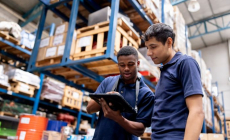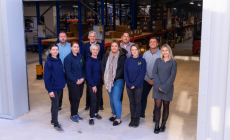-
Nulogy Introduces the Manufacturing Operating System - February 27, 2026
-
Bliss Direct scales to 300 daily orders and saves 25 hours per week with Forterro’s Orderwise ERP - February 25, 2026
-
Wootzwork raises $6.6M to bring predictability to offshore manufacturing - February 25, 2026
-
Rite-Hite unveils new range of hydraulic kits to upgrade and extend dock leveller performance - February 19, 2026
-
REWE and Cimcorp automate fresh supply chain for Berlin supermarkets and stores - February 19, 2026
-
Q1 – A recovery period or time to fix, switch and scale? - February 19, 2026
-
NULOGY’S SHOP FLOOR SOFTWARE TO POWER COMPLETE CO-PACKING’SOPERATIONS - February 13, 2026
-
Why lead generation depends upon good content - February 13, 2026
-
Wallapop and Albatross Sign Strategic Partnership to Bring Real-Time AI Discovery to the Future of Consumer-to-Consumer Commerce - February 12, 2026
-
Thorworld ramp helps Hubergroup to streamline its unloading operation - February 6, 2026
Connectivity challenges threaten to derail logistics sector’s IoT ambitions.
Top three challenges to successful IoT deployments in transportation sector: IoT skills (54 per cent), integrating IoT with existing systems (43%) and connectivity (40%)
Unreliable communication networks may render logistics businesses unable to capture full value from the Internet of Things (IoT). This is according to the 100 global transport and logistics companies interviewed by Inmarsat (LSE: ISAT.L) the global mobile satellite company for its ‘The Future of IoT in Enterprise – 2017’ report.
The research suggests that while 96 per cent of transportation and logistics organisations believe that the success of their IoT deployments is based on reliable ubiquitous connectivity, many businesses are still struggling to access the connectivity they need. 40 per cent identified connectivity issues as one of the biggest challenges facing their IoT deployments, with only IoT skills (54 per cent) and the integration of IoT technology (43 per cent) seen as more problematic. Worryingly, 28 per cent stated that connectivity issues threatened to derail their IoT deployments before they had even begun.
Effective multi-modal, global logistics is reliant on the vast amounts of data gathered through IoT sensor technology, in order to analyse the behaviours of freight vehicles and cargo. However, without ubiquitous global connectivity these sensors are not always able to function, blunting the ability of businesses to efficiently orchestrate their supply chains.
Mike Holdsworth, Director of Transport at Inmarsat Enterprise commented: “In an increasingly inter-connected world, more cargo is moving through more geographies and more modes of transport to reach its destinations. This increasing complexity brings with it new risks and uncertainties, and creates a pressing need for logistics businesses to increase their visibility over the supply chain and make efficiencies, which is where IoT can help. If you can monitor cargo from its point of production to its point of delivery, you can cut down on wastage, understand and adapt levels of supply and ensure security. With a combination of IoT sensor technologies, such as Radio Frequency Identification tags, Bluetooth Low Energy and Low Power Wide Area Networks the movement of goods and things can become more efficient.
“However, the remote location of transport networks and routes clearly poses a challenge for logistics businesses. We can see from our research that gaps in connectivity are proving problematic to successful IoT deployment. Terrestrial communication networks may only provide sufficiently reliable connectivity solutions for IoT to function in parts of any given route, meaning vital assets such as trucks, trains, and ships, may enter communications blackspots when they are at most risk, in remote and potentially hazardous environments. For logistics businesses to access the full value of IoT, they must have reliable, continuous connectivity that enables them to constantly track their assets on a global scale,” he continued.
Holdsworth concluded: “Working with our partners, Inmarsat L-band services provide global satellite connectivity with up to 99.9% uptime for efficient, global solutions for fleet and cargo management across road, rail and sea. We combine our expertise in critical communications with cellular and terrestrial connectivity, LoRaWAN technology and data analytics platforms to enable the connected world. With our global connectivity solutions, we are enabling IoT projects to thrive, even in the most remote and hostile environments, providing transportation companies with the reliable end-to-end connectivity they require to move into the fourth industrial revolution.”

































